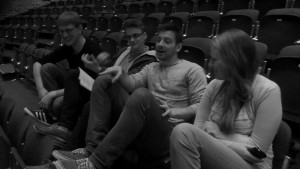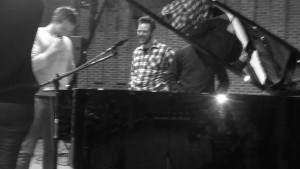Adding the trimmings to the Christmas (composition) shopping trolley
Paul Bryant (year 3) explains how the experience of hearing his music in a workshop with professional musicians has changed his views on composing:
As a third year composer, I am finding myself develop an interest into the widely eclectic discipline of composition, looking to understand some of the many methods to effectively communicate through music. However, after today’s experience I have been caught off-guard, now viewing composition in a completely different light.

Reading books and analysing scores are merely the provision of raw vegetables and half-clucking turkeys in the trolley of ingredients to prepare one’s Christmas Day feast. Hearing and watching your composition being performed by professional musicians, having the opportunity to discuss your music with them, deciphering how performers comprehend your aesthetic intentions through notation and therefore discovering ways to make your compositional ideas clear to the performer, adds the gravy, roast potatoes and those all-important trimmings to the Christmas ingredients trolley.

On 5th December Aisha Orazbayeva and Roderick Chadwick joined the third year Composition Portfolio students, myself included, for a composition workshop focused on our new violin and piano pieces. The day encompassed the performances of a variety of musical styles and artistic intentions including time-notated composition to aural and visual depictions of rain, as well as harmonically restricted yet mysteriously illuminating modal composition to the outrageously experimental and nail-bitingly tense. We each had 30 minutes with the musicians to workshop our pieces in the Turner Sims Concert Hall. In this time we got to hear, watch, record and discuss our pieces, finally getting to release our well-laboured compositions from its paper bounds into the wondrous atmospheric musical space that surrounds us!

I was initially surprised at the level of enthusiasm the musicians had for contemporary classical music, music we all know is often sadly neglected in the wider world. However, after settling in throughout the day and gathering expertise and insight into other compositional voices, I started to understand the bigger picture. It was a shock of realism, eventually grasping that how music is performed is fundamentally one of the most crucial steps in the compositional process, rather than assuming that any old notation will be performed exactly as intended. It is this simple, but often neglected notion that arguably separates a good composition from being a great one, something I am personally very grateful to have learnt from this experience.

Communication is an absolutely vital asset in our everyday human society, an asset one must not mistakenly divorce from music as it is just as vital in compositional writing as it is in any other discipline. It was such a fantastic and enlightening opportunity and I very much hope to be involved with similar opportunities in the future!
